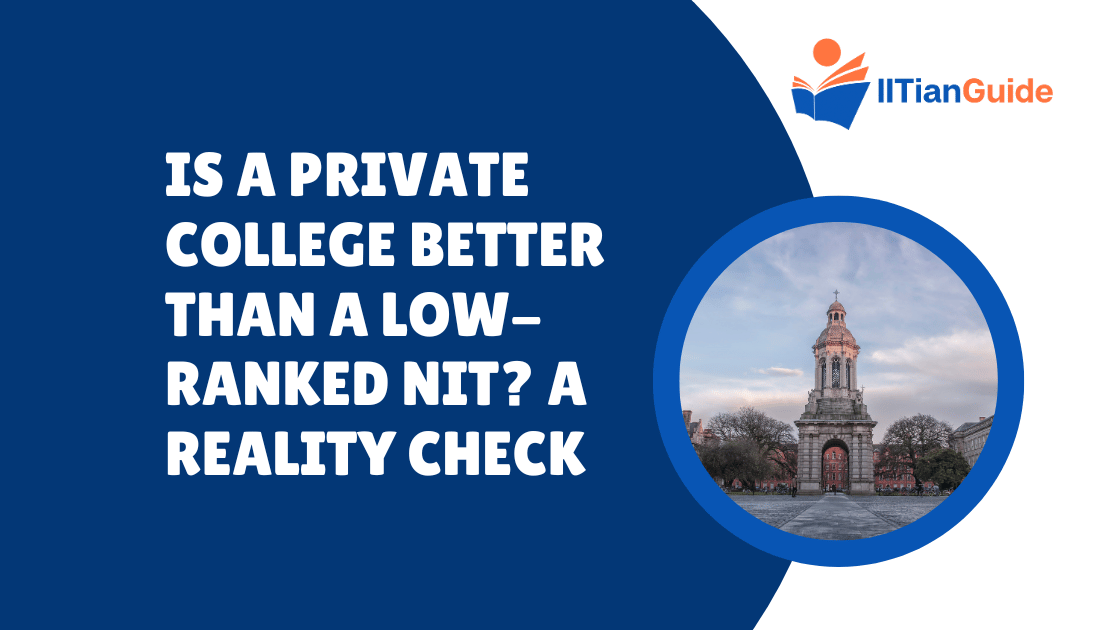Is a Private College Better Than a Low-Ranked NIT? A Reality Check

Every year, thousands of JEE Main aspirants face a tough decision—should they opt for a low-ranked NIT or a reputed private engineering college? With the JEE Main 2025 April attempt approaching, many students are concerned about their future, wondering whether an NIT tag outweighs the facilities and placement advantages of a top-tier private institute. In this article, we break down the reality of this choice to help you make an informed decision.
1. Reputation & Brand Value
National Institutes of Technology (NITs) are among India’s premier engineering institutions, carrying significant brand value. However, not all NITs enjoy the same level of prestige. A lower-ranked NIT may not offer the same opportunities as its top counterparts like NIT Trichy or NIT Warangal.
On the other hand, top private engineering colleges like BITS Pilani, IIIT-Hyderabad, and VIT Vellore have built strong reputations, sometimes surpassing low-ranked NITs in terms of placements and industry recognition.
2. Faculty & Infrastructure
|
Factor |
Low-Ranked NIT |
Top Private College |
|
Faculty Quality |
May vary, often research-focused |
Industry-aligned, experienced faculty |
|
Infrastructure |
Government-funded but may lack modern facilities |
Advanced labs, smart classrooms |
|
Research Opportunities |
Strong in some departments, limited funding in others |
Research focus varies, funding available in top private colleges |
Government funding ensures that NITs have access to research grants, but lower-ranked ones might not have cutting-edge infrastructure. Private colleges invest heavily in modern facilities, but faculty quality can be inconsistent across departments.
3. Placements & Industry Exposure
The JEE Main 2025 April attempt is not just about securing a seat—it’s about ensuring a promising career. The biggest concern for students is placement opportunities. Here’s a comparative analysis:
- Low-ranked NITs: Core engineering branches may have moderate placements, with an average salary of 5-8 LPA in some cases. However, placements in newer or unpopular branches can be weak.
- Top private colleges: Institutes like BITS Pilani and IIIT-H boast top recruiters and sometimes offer higher salary packages than lower-tier NITs.
- Location matters: NITs in remote areas may have fewer industry collaborations, while private colleges in metro cities offer internships, startup culture, and networking advantages.
4. Fees & Return on Investment (ROI)
|
Factor |
Low-Ranked NIT |
Top Private College |
|
Tuition Fees |
Around ₹1.5-2.5 lakh/year |
Can go up to ₹5 lakh/year |
|
Scholarships |
Government-funded options available |
Limited merit-based options |
|
ROI (Return on Investment) |
Higher due to subsidized education |
Varies based on placements |
While NITs offer subsidized education, private colleges often charge higher tuition fees. However, the return on investment depends on placement quality—a private college with strong placements may justify the cost.
5. Campus Life & Peer Network
Campus life in NITs is enriched by cultural festivals, government-backed research projects, and a pan-India peer group. The diversity in an NIT adds to a student’s overall growth. Private colleges, however, focus more on industry-oriented programs, startup incubators, and global collaborations.
Conclusion: Which One Should You Choose?
The choice between a private college and a low-ranked NIT depends on your priorities:
- If you value the NIT tag, government support, and a lower fee structure, an NIT is a solid choice.
- If placements, infrastructure, and industry exposure matter more to you, a top private college can be a better option.
- Research specific branches, placement records, and faculty quality before making a decision.
With the JEE Main 2025 April attempt approaching, aspirants should focus on maximizing their scores to get into the best possible institute. For more expert guidance on JEE Main preparation, college admissions, and career advice, visit IITian Guide.
Frequently Asked Questions (FAQs)
- Which has better placements, a low-ranked NIT or a top private college?
Placements vary by branch, location, and industry demand. Top private colleges like BITS Pilani or IIIT Hyderabad often have better salary packages than some low-ranked NITs.
- Is the NIT tag worth it if the college is ranked low?
The NIT tag carries weight, but a low-ranked NIT may not guarantee better placements. Research the specific department, faculty, and industry tie-ups before deciding.
- What should be the priority while choosing between an NIT and a private college?
Consider placements, infrastructure, fees, faculty quality, and location. A private college with strong industry links and modern facilities may be a better choice than a poorly ranked NIT.
- Do private colleges offer better infrastructure than NITs?
Yes, in many cases. Private colleges invest heavily in modern classrooms, labs, and research centers, whereas some low-ranked NITs may struggle with outdated infrastructure.
- How does location impact placements?
NITs in remote areas may have fewer company visits, whereas private colleges in cities benefit from corporate tie-ups, internships, and networking opportunities

